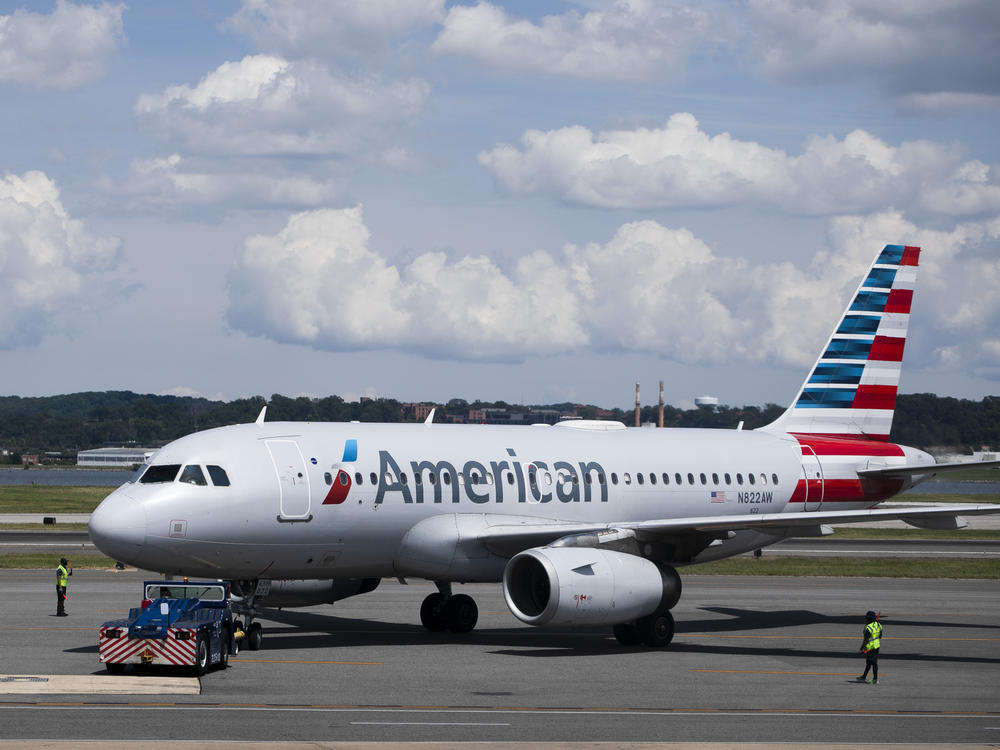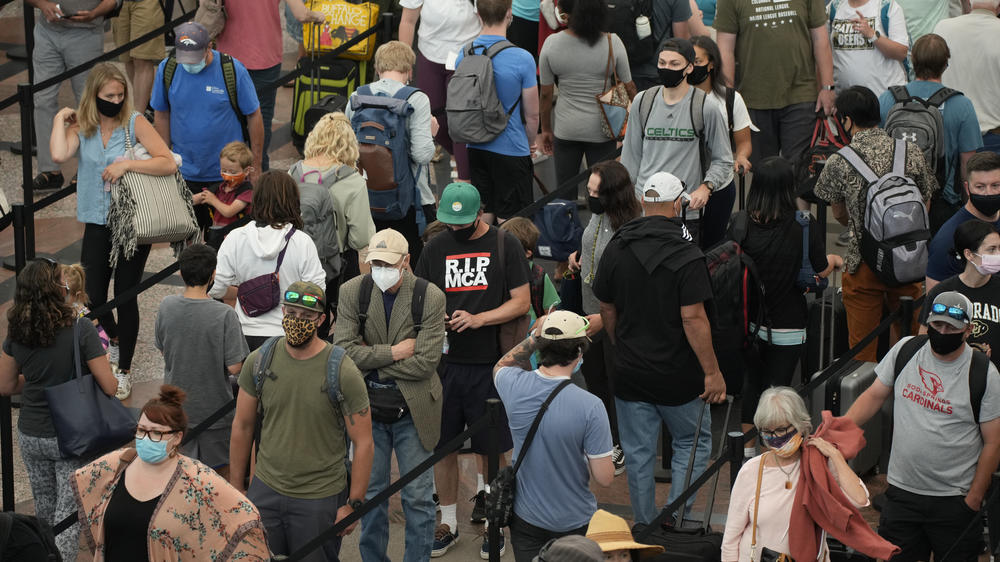Section Branding
Header Content
American Airlines Passengers Could Be In For A Summer Of Delays And Cancellations
Primary Content
Just as hundreds of thousands of Americans return to the skies again this summer, many of the old inconveniences and aggravations of commercial airline travel are back, too. And experts say travelers should expect ongoing problems throughout the busy summer season.
Long lines at security checkpoints, disruptive passengers and lengthy flight delays and cancellations are greeting many air travelers who may not have boarded a plane in 15 months or more because of the pandemic.
Passengers on American Airlines have had it especially rough, with the airline canceling hundreds of flights in recent days because of staffing shortages and what the airline in a statement calls "unprecedented weather."
The airline canceled more than 120 flights on Saturday, 188 on Sunday, and at least 162 on Monday, Flight Aware reported. Additionally, the flight tracking website said, 760 American flights were delayed Sunday, and nearly 800 flights were delayed Monday.
Weather and staffing have caused problems
In a statement, American cited "unprecedented weather" as one of the causes of the company's recent troubles.
Indeed, violent thunderstorms the last few days affected some of the country's biggest airports, including Dallas-Fort Worth International, Chicago's O'Hare International, Atlanta's Hartsfield-Jackson International and Washington Dulles International, among others.
The airline also explains it has preemptively canceled flights ahead of time to minimize surprises for passengers at the airport, saying its cancellations are primarily in markets with multiple options for passengers to rebook on other flights.
Going forward, American is now proactively canceling about 1% of its scheduled flights each day through the middle of July. An American spokeswoman said that amounts to about 50 to 80 of the airline's daily departures.
But Capt. Dennis Tajer, a 737 pilot for American Airlines and a spokesman for the airline's pilots union, told NPR the issue stems from the company's aggressive plan to restore flight schedules to near pre-pandemic levels despite a severe pilot shortage as a result of strategic moves made during the pandemic.
Early retirement offers and furloughs created a shortage
To save money during the global travel slowdown, Tajer said, American offered pilots who were nearing retirement a buyout package. "About a thousand pilots took advantage of that," he estimated.
"The thing about that is that now you have to train a new pilot into that seat. Just because a captain of a 737 goes out the door, the airplane is still there, and you've got to find a replacement," the pilot said.
He noted that while it may have been a good cost-saving measure at the time, it has only served to exacerbate American's bigger problem: It can't train and recertify pilots fast enough to meet demand.
Despite $50 billion in grant bailouts that were used to prop up the airline industry through the downturn and ensure they'd be ready when customers returned, American fell behind on its obligation to keep its pilots certified and up to date on flying requirements, Tajer said.
"Instead, American was the only major network to furlough pilots," he recalled.
Roughly 1,600 pilots were put on a leave of absence for several months. "That means that for all of that time, they were not flying regularly or training on simulators to be certified to fly like they are required to be."
In a statement, American spokeswoman Gianna Urgo told NPR that all "previously furloughed pilots were recalled in December 2020 in accordance with the extension of the Payroll Support Program, and began returning to training and work based on operational need."
Dispute over a training and certification bottleneck
According to Urgo, "pilot training remains on track" and the company is on schedule to have all recalled pilots "complete training by the end of June."
Tajer said that is overly optimistic, and alleged a bottleneck in the training and recertification pipeline caused by an instructor shortage, as well limited access to the needed types of flight simulators, have slowed things down. In many cases, he said, "it can take up to two months" to regain flying status.
An email from American officials to employees dated April 20, and obtained by NPR, projected all recalled pilots would be returning to flying status "by the end of the summer."
In the best cases, this spells potential frustration for anyone with summer travel plans, according to Tajer, while, in the worst cases, it could be "a total disaster for some people."
He noted a recent internal message to employees touting the airline's new destinations under a headline reading, "A Great American Summer."
It could be that, he said. "Or will it be a great American bummer?"
Copyright 2021 NPR. To see more, visit https://www.npr.org.


